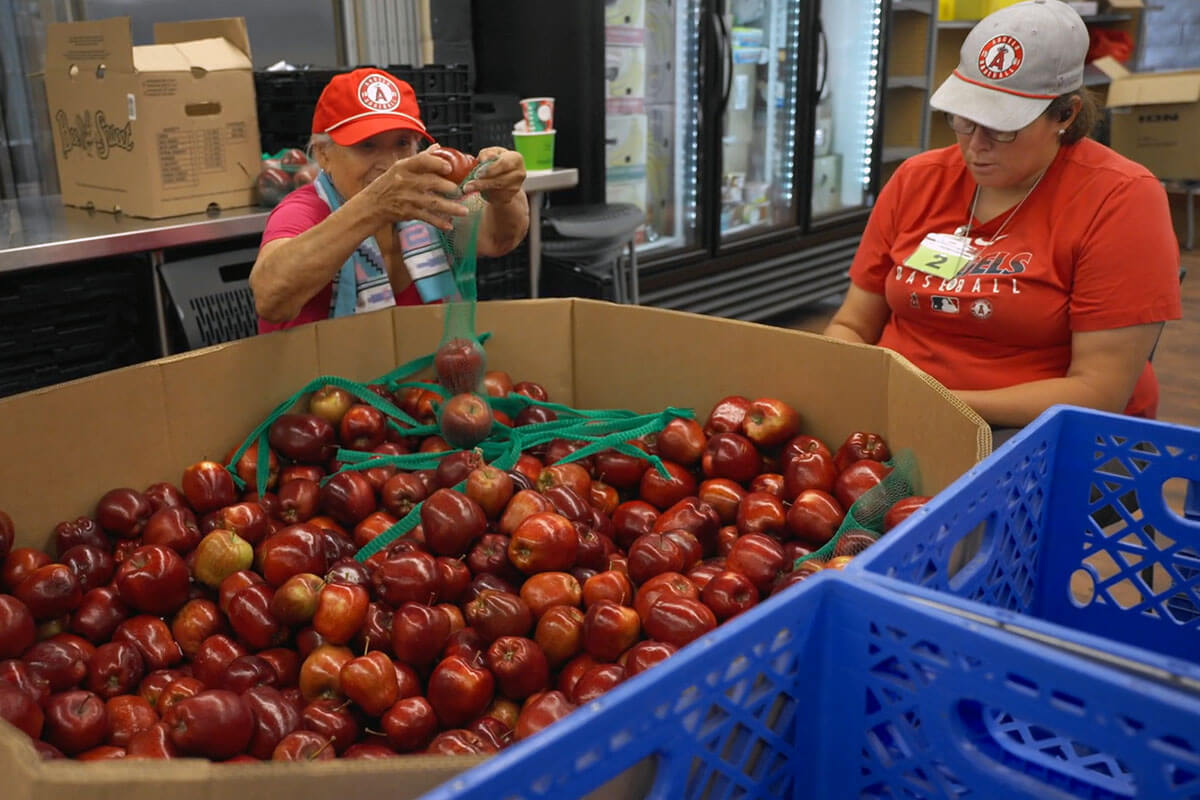Key points:
- Even before the federal government shutdown, United Methodist ministries across the U.S. faced growing demands and reduced federal support.
- With the suspension of federal food assistance as of Nov. 1, church pantries plan to step up. But leaders emphasize that they will need help.
- United Methodist Board of Global Ministries also is announcing a new grant program to bolster food ministries at a time when it’s desperately needed.
Food pantries in the U.S. used to serve as the bridge that got people over the hump to their next paycheck or next month’s benefits.
“Now, food pantries are the entire road,” Lee Strohm said. He is the director of Neighbors Pantry at Anaheim United Methodist Church.
Located two miles from Disneyland in California, Anaheim United Methodist already has seen demand for its services surge this year — starting in February with the federal cuts by Elon Musk’s Department of Government Efficiency. The church pantry, which operates by appointment, has gone from serving about 650 people a week to about 750 people.
Strohm and leaders of other United Methodist food ministries across the country only expect people’s needs to grow now that the Trump administration has announced the suspension of federal food assistance starting Nov. 1 as the government shutdown drags on.
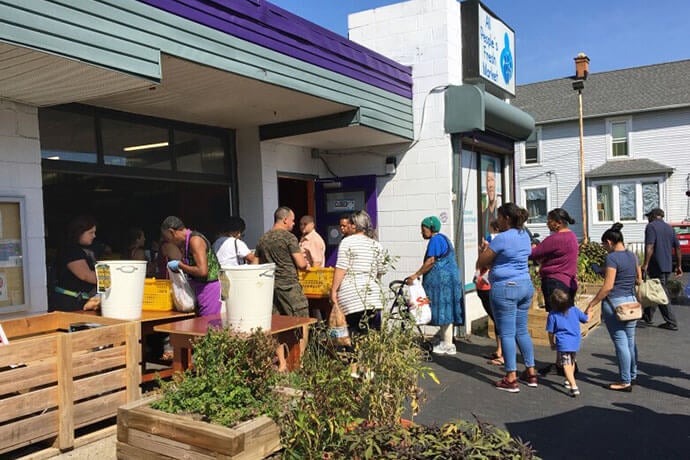
Some 42 million Americans rely on monthly payments from the Supplemental Nutrition Assistance Program — also known as food stamps — which go directly on their electronic benefit transfer cards. Families are now scrambling to figure out how they will pay their bills and put food on the table — just weeks before Thanksgiving when Americans traditionally celebrate God’s bounty.
Ways to help and get help
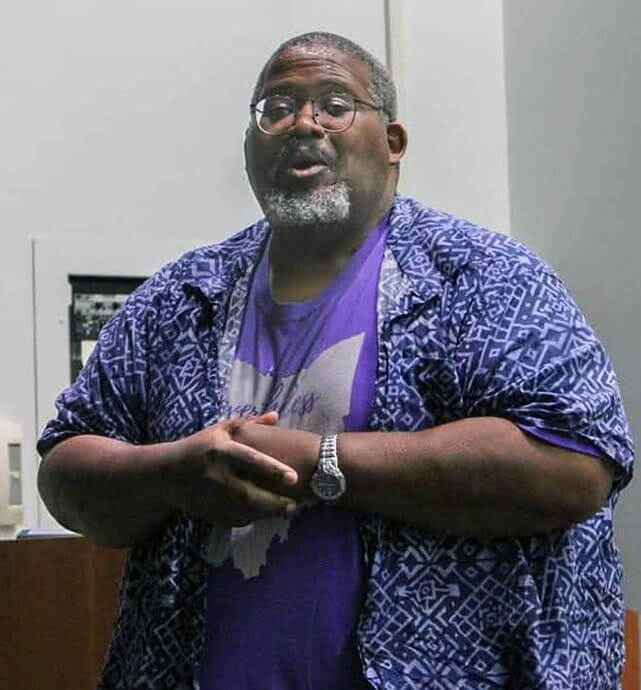
If you are in need of food assistance in the U.S., your best bet is to call 211. That’s the way to reach a nationwide information and referral service, available 24/7. In most U.S. communities, 211 has the most comprehensive database of local service providers, including what’s offered by local churches. Ask The UMC, a ministry of United Methodist Communications, has more information on 211.
Below is more information about the ministries included in this story. Prayers and financial donations are always welcome.
- Neighbors Pantry at Anaheim United Methodist Church in California.
- United Methodist Church and Community Development for All People in Columbus, Ohio.
- Marketplace for All People at St. Paul’s United Methodist Church in Toledo, Ohio.
- The United Methodist Open Door in Wichita, Kansas.
- Reelfoot Rural Ministries in Dyersburg and Obion, Tennessee.
- Rising Hope Mission Church in Alexandria, Virginia.
The current crisis follows the U.S. Department of Agriculture nixing funding in March for two programs that helped schools and food banks buy food directly from local farms and ranches. It also comes as people across the U.S. deal with persistent inflation, and many are bracing for the more long-term cuts to federal food, health and housing assistance included in the federal One Big Beautiful Bill Act approved this summer.
Leaders of United Methodist ministries across the U.S. plan to do all they can to follow Jesus’ command to care for the most vulnerable and keep the hungry fed. But they also emphasize that they will need help from their fellow church members, and many bishops are also urging the faithful to support their local food pantries.
“This is really a chance for the church to be the church and step up,” said the Rev. Joelle Henneman, senior pastor of United Methodist Church and Community Development for All People in Columbus, Ohio.
For more than 25 years, the multiethnic and cross-class congregation has provided a variety of social services. Its ministries include All People’s Fresh Market, one of the largest distributors of free food in Ohio with a grocery-store-like layout that has been a model for other United Methodist food ministries.
The market serves an average of 450 people each weekday and gives out more than 3 million pounds of fresh produce every year.
“The government can do things at a bigger level than a local church can,” Henneman said. “But for us, this is an opportunity to reclaim our neighborhood, to care for each other, to support each other and to be the church.”
About 144 miles northwest of Columbus, St. Paul’s United Methodist Church in Toledo, Ohio, operates a similar food ministry named Marketplace for All People.
St. Paul’s ministry already had to scramble earlier this year when two local food banks could not meet orders because of federal-funding cuts. At the same time, the ministry is seeing an increase in first-time shoppers, said the Rev. Leo Cunningham, the church’s senior pastor.
In these days of high need and reduced government support, Cunningham said he is leaning on the United Methodist connection. At this point, two nearby churches are supplementing what the ministry calls its “Manna Bags” — which each contain a protein, carbohydrate, fruit and snack that like the biblical manna require no cooking to enjoy. Another two churches supply volunteers for St. Paul’s marketplace. And pastors of yet two more churches have recently joined the ministry’s board and are working to get their congregations involved.
“It’s been a good response,” Cunningham said. “A lot of churches are seeing this and they’re feeling helpless. They ask, ‘What is it that we can do? We’re just a small-member congregation.’”
He suggests focusing on one already established ministry in your local area. “Instead of us doing a million things an inch deep,” he said, “let’s do one or two things a million inches deep.”
Neighbors Pantry in Anaheim already has its appointments booked up into November, Strohm said. He and the Rev. Jessica Strysko, the Anaheim church’s senior pastor, urge people to call their congressional representatives and do whatever they can to support their local food pantries and food banks.
“People can help whether that’s volunteering, whether that’s doing a food drive, or whether that’s donating money,” Strohm said.
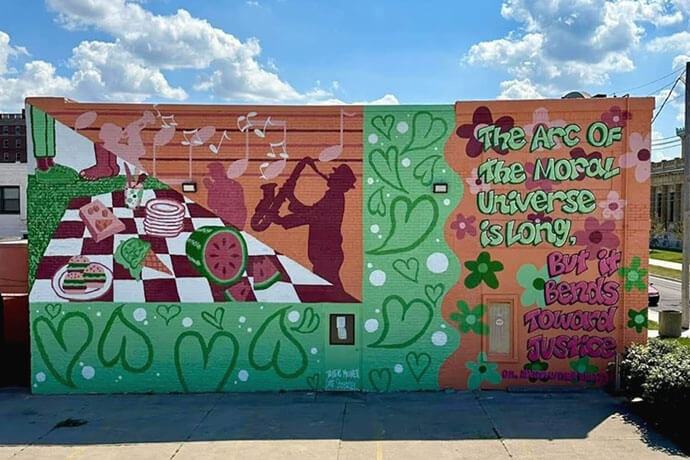
Nevertheless, nonprofit leaders across the U.S. warn they cannot completely fill the hole left by the withdrawal of about $9 billion in monthly food stamps.
Food ministries in action
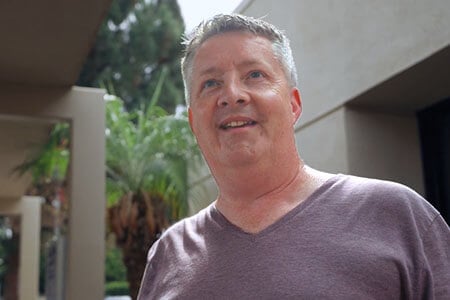
Amid the shutdown, United Methodist conferences across the U.S. are highlighting how food pantries within their borders are making a difference.
- The California-Pacific Conference has a video on the Neighbors Pantry at Anaheim United Methodist Church in California.
- The Virginia Conference has a video on the Belmont Food Pantry at Belmont United Methodist Church in Richmond.
- The Upper New York Conference has an overview of how its food pantries are faring.
- The Holston Conference has a story on how churches are working to meet rising requests for food, utility and housing aid.
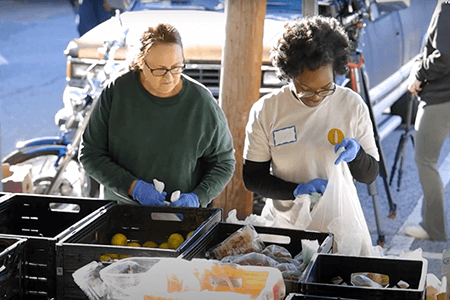
The Rev. Deann Smith, executive director of The United Methodist Open Door in Wichita, Kansas, said the food-distribution and homeless ministry is facing a great deal of uncertainty. The ministry receives some food through the Temporary Emergency Food Assistance Program, but already that supply is dwindling as demand increases.
“If we’re giving and giving as faith communities — and I’m not just talking United Methodists but all faith groups — then we also need the government to play a part in this,” she said. “It’s about quality of life. … I understand that we can’t support everybody and anybody. But that’s not what we’re asking. We have a lot of working people who still need that support.”
Even with the shutdown, the Supplemental Nutrition Assistance Program has not run out of money. The U.S. Agriculture Department’s Oct. 26 announcement that it was suspending SNAP payments reversed its earlier plan — since deleted from its website — to use $6 billion in its contingency fund to cover benefits. However, that amount still falls short of paying for a full month of the program.
States operate the program, and 25 states are suing the Trump administration to restore SNAP funding. On Oct. 31, two federal judges — in separate rulings issued just minutes from each other — said the Trump administration must use contingency funds to pay for the benefits.
For now, many church leaders — including the Council of Bishops — are urging elected leaders to work together to end the shutdown.
“We call on members of the United States Congress and all elected leaders to set aside partisanship, seek common ground, work together toward a just resolution and act responsibly for the sake of the welfare of all people who they have been elected to serve,” wrote Council of Bishops President Tracy S. Malone in a pastoral letter on behalf of the bishops. The letter also encouraged United Methodists to pray for wisdom for elected leaders and for individuals and families at risk.
At issue in what is now the country’s second-longest government shutdown is a fight over health care policy. Democrats are refusing to vote for the Republican majority’s short-term funding bill unless it extends tax credits that help people pay their insurance premiums under the Affordable Care Act. Among more than 20 million Americans, a number of United Methodist employees depend on the Affordable Care Act marketplace for their health coverage. On Nov. 1, open enrollment begins, and without the tax credits, many expect premiums of many plans to double.
In the meantime, U.S. Speaker of the House Mike Johnson has sent fellow Republican House members home for the past six weeks while pushing for the U.S. Senate to approve the House bill unaltered. The U.S. Senate has so far held more than a dozen votes on that bill without receiving the necessary votes from Democrats to pass it under current Senate rules.
As the impasse continues, much of the federal workforce is going without full pay including air traffic controllers and military service members. U.S. House staff members are set to miss their paychecks on Oct. 31.
“I don’t care who wants to claim the win,” said the Rev. Robert Craig, executive director of the United Methodist-related Reelfoot Rural Ministry. “People need to be paid their salaries that they’re working for, and people need to get the food and child assistance that has been committed to them because that’s how they budget,” he said. “So, to rip it away from them is inhumane — much like not paying people for working. But healthcare is vitally important as well.”
Among other services, Reelfoot Rural Ministry provides groceries for people in northwestern Tennessee and southwestern Kentucky. The ministry has seen its client base more than double this year, increasing from an average of 50 households to between 125 and 130 households each week. Craig also is making plans to distribute hams this holiday season because a turkey shortage is causing prices to soar for the traditional Thanksgiving dish.
As he sees it, neither food nor health care help should be in dispute.
“People need health care, and people need to be fed, and babies need diapers,” he said. “So, just get together and make it happen.”
Subscribe to our
e-newsletter
The Rev. Kameron M. Wilds is the pastor of the nearly 30-year-old Rising Hope Mission Church in Alexandria, Virginia, just outside D.C. The United Methodist congregation and outreach ministry is particularly sensitive to whatever is happening in the U.S. capital.
Since this winter, the church has experienced the ripple effects of the mass federal layoffs and now is dealing with the shutdown. When federal workers have no money, Wilds said, that means they are not going out to eat or they aren’t hiring someone for lawn-care maintenance. He said his ministry ends up mainly serving the restaurant workers, house cleaners and gardeners — people who live paycheck to paycheck and can’t take the financial hit.
Even as needs rise, he said churches don’t need to start their own food pantries to help but look to join in partnerships to enhance the work United Methodist ministries like his are already doing.
“We’ve been doing this work before a government shutdown came and we were prepared when it happened to the best of our ability. We don’t have to maneuver and shift our priorities,” he said. “We are here to help individuals experiencing the crisis of homelessness and poverty, and if that fits who you are, we’re here for you.”
Mission agency, churches work to fill gaps
Hahn is assistant news editor for UM News. Contact her at (615) 742-5470 or [email protected]. To read more United Methodist news, subscribe to the free UM News Digest.

